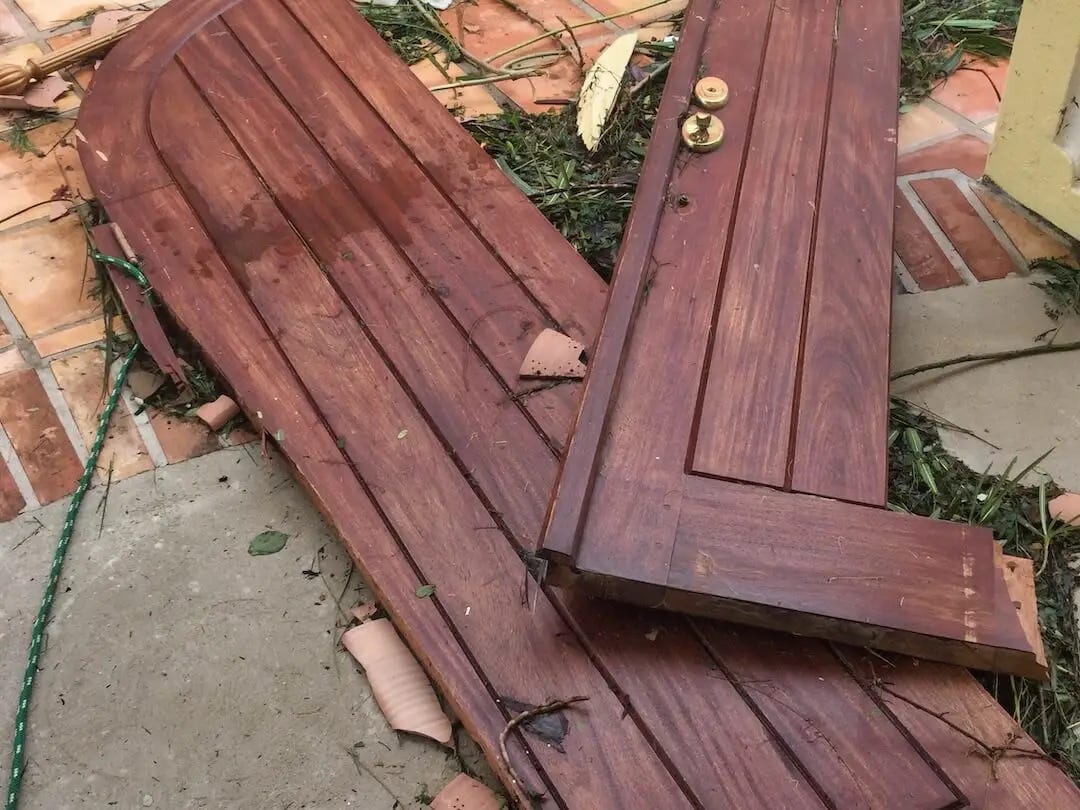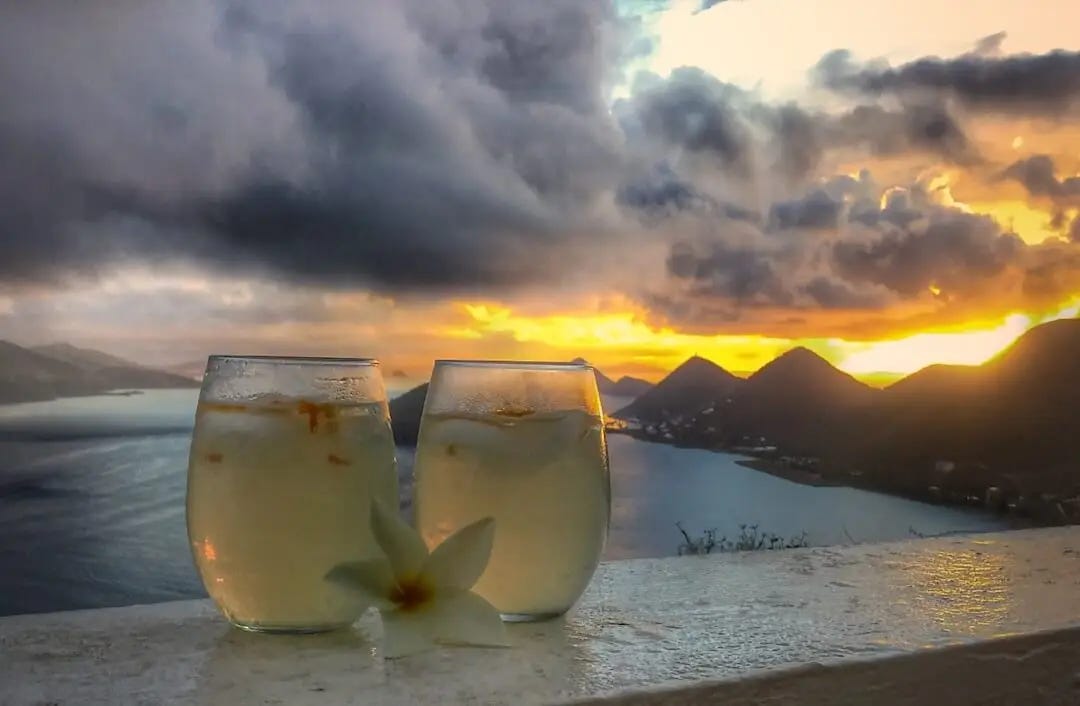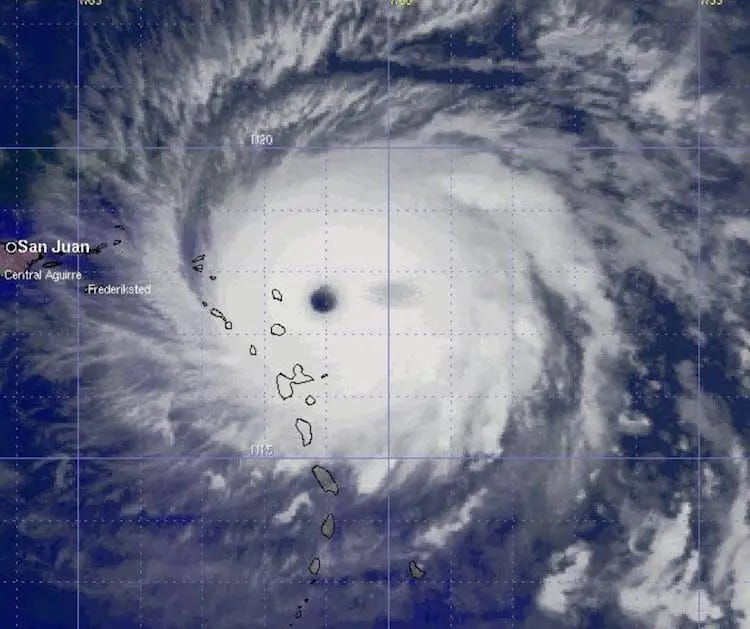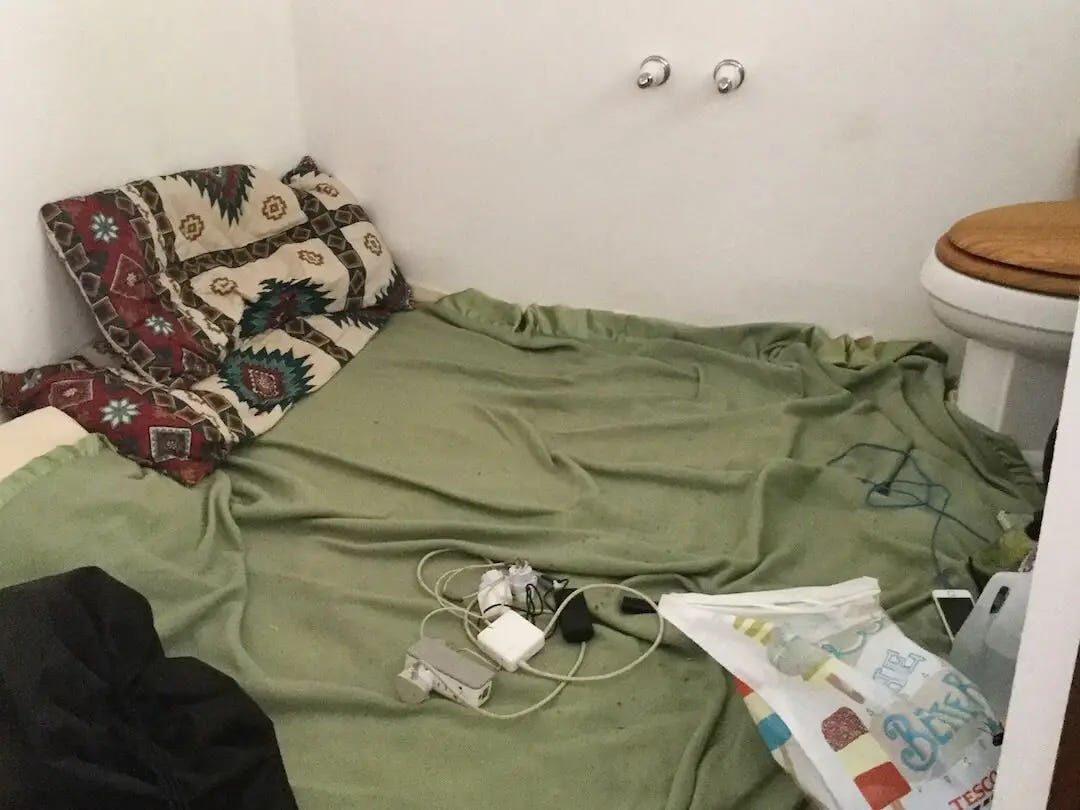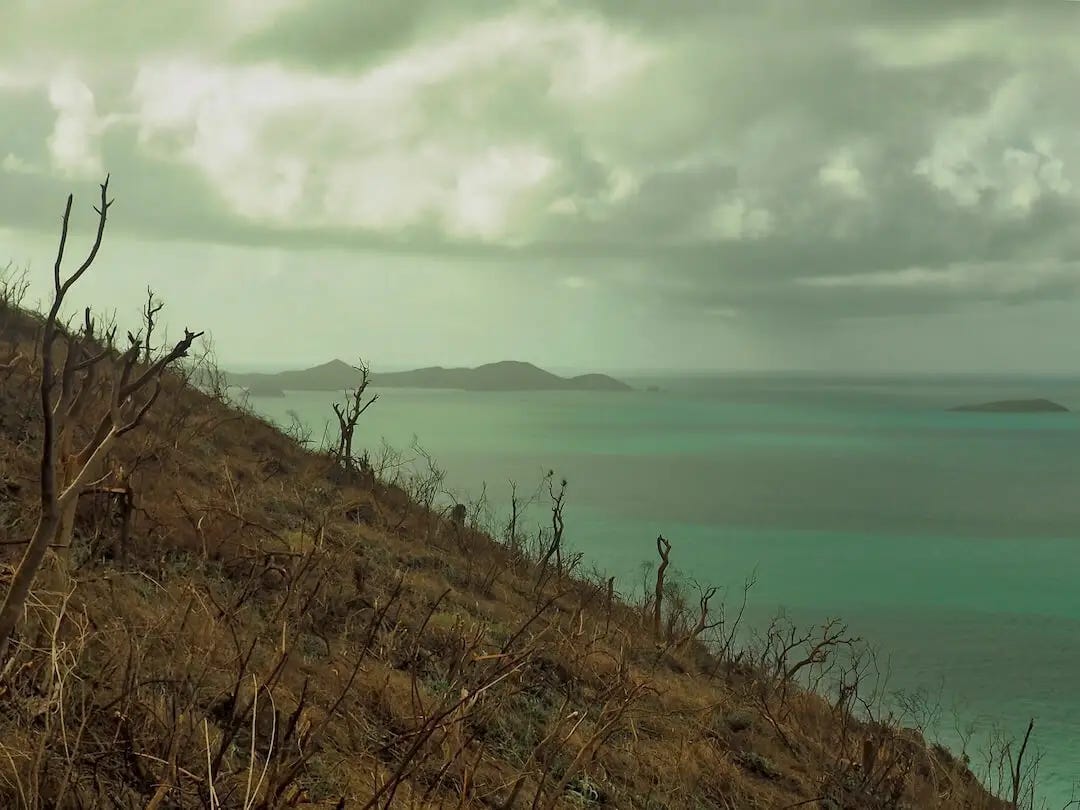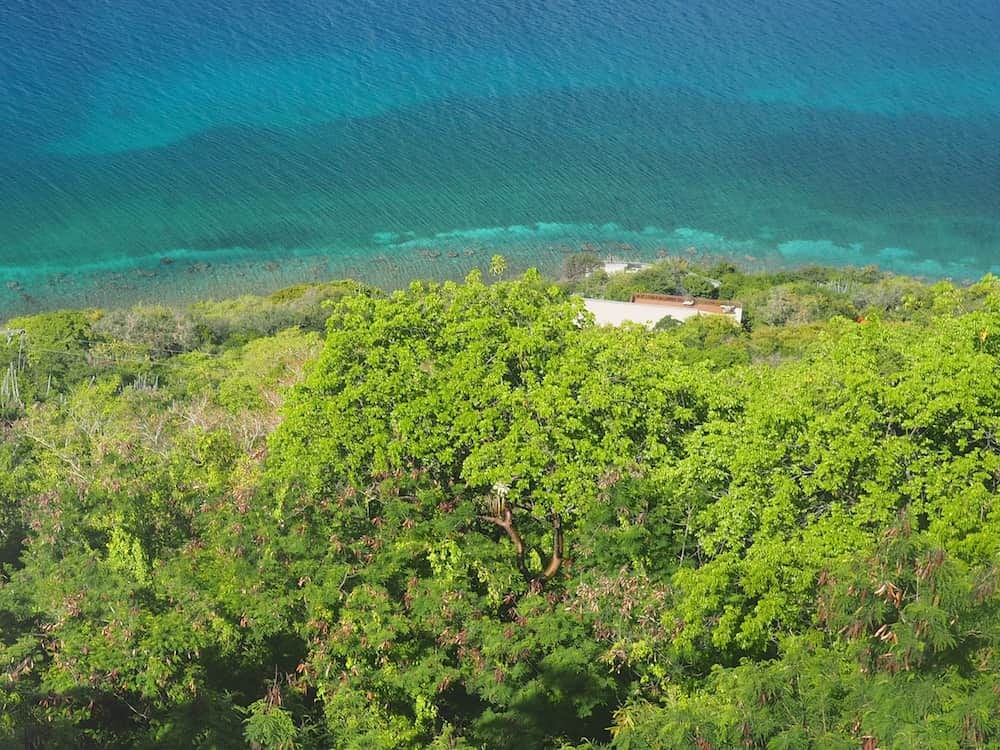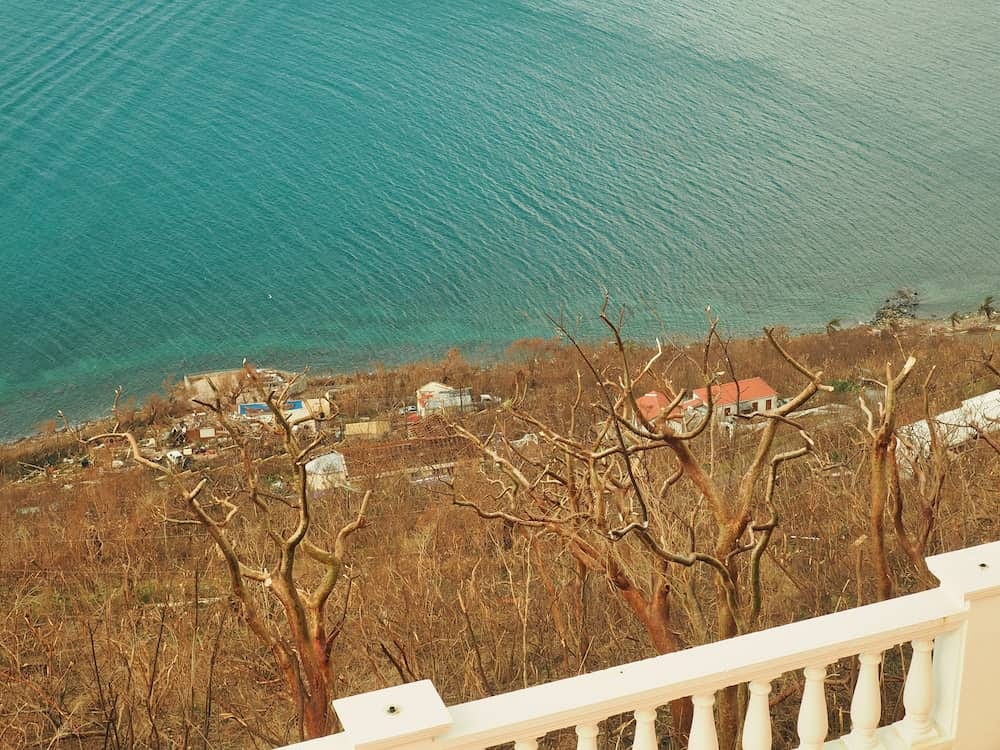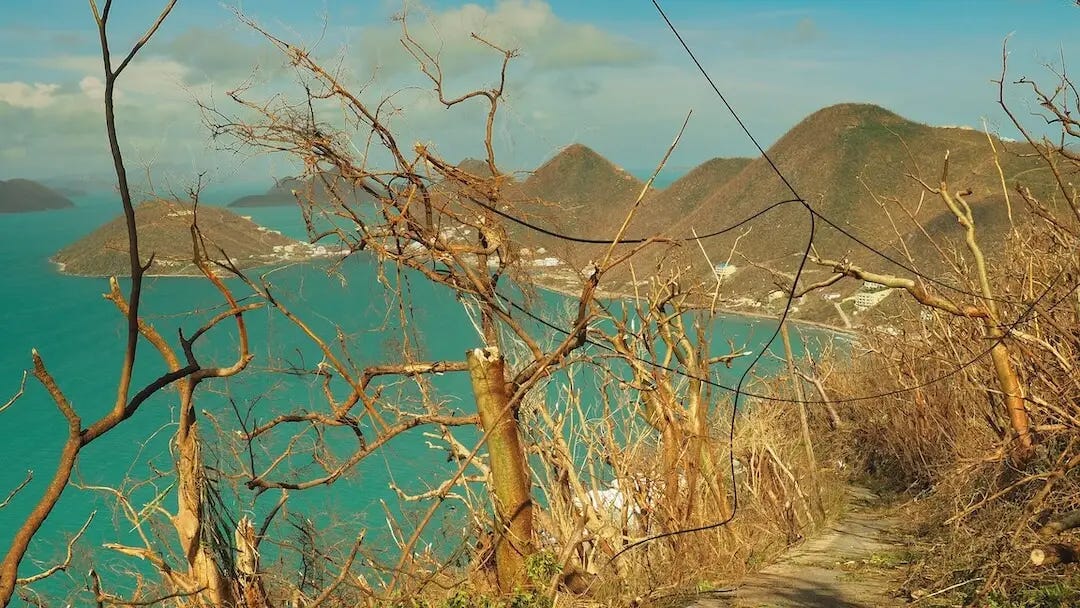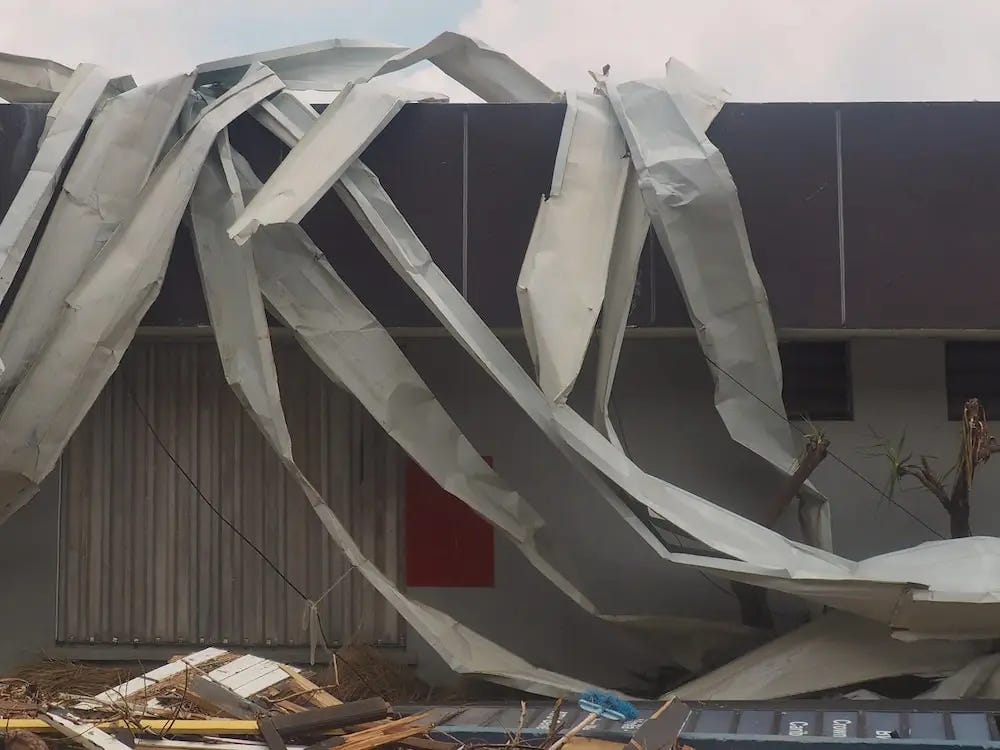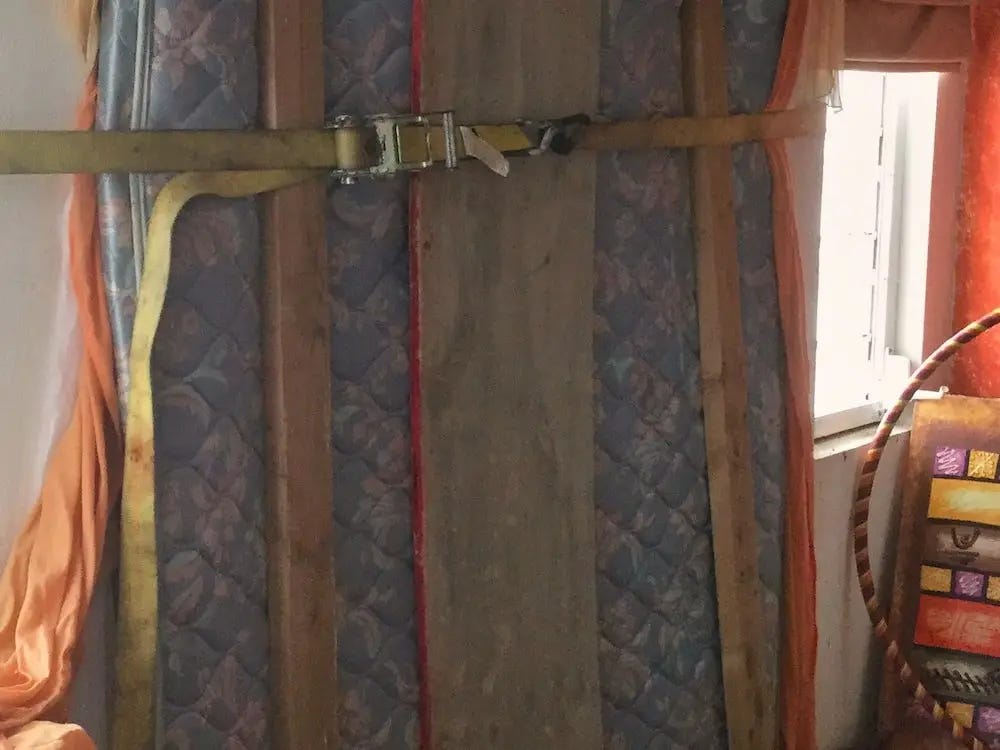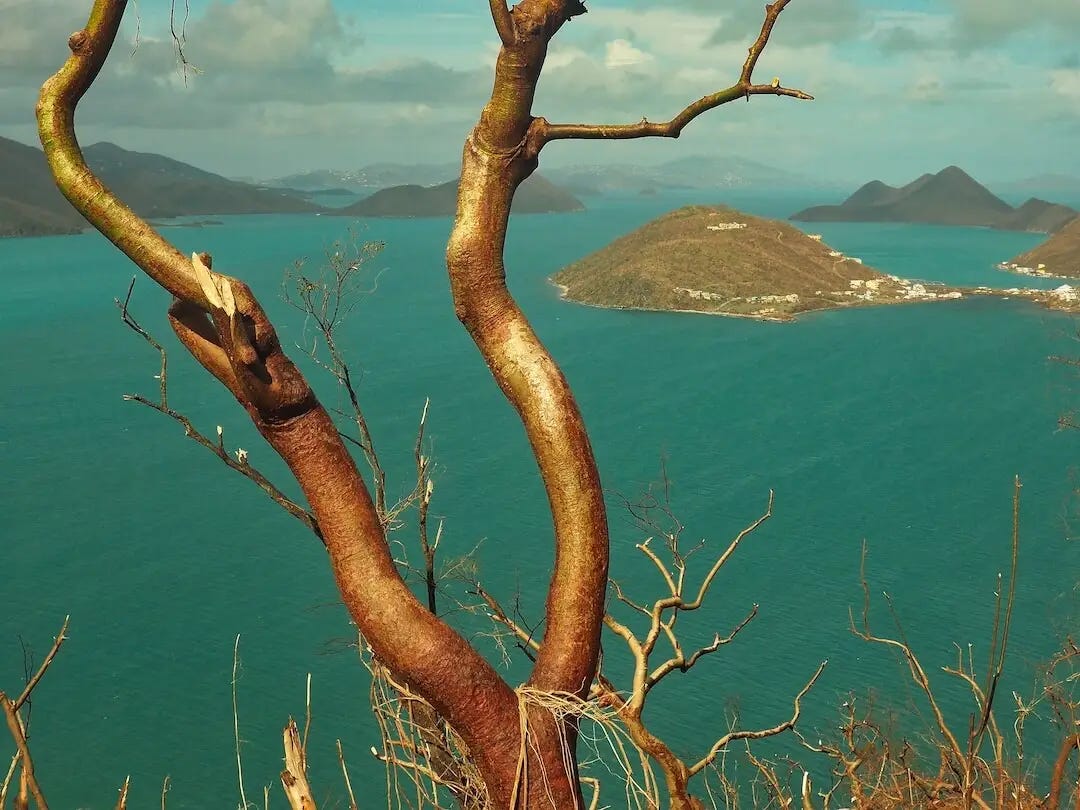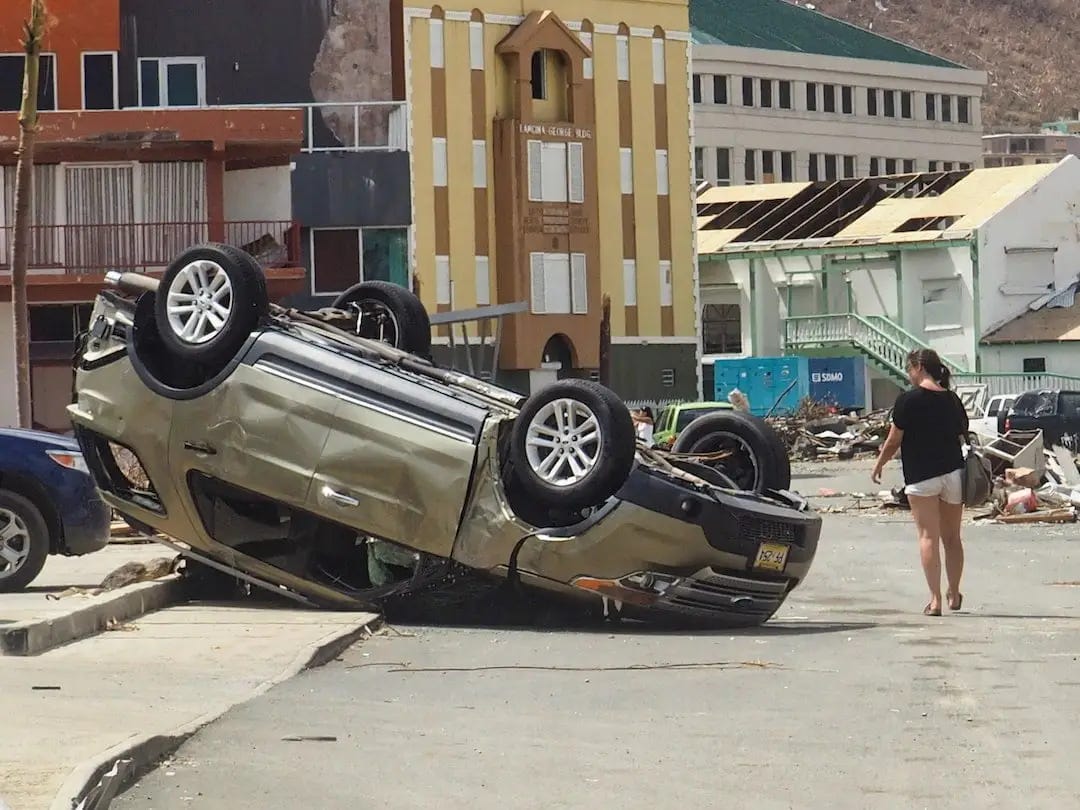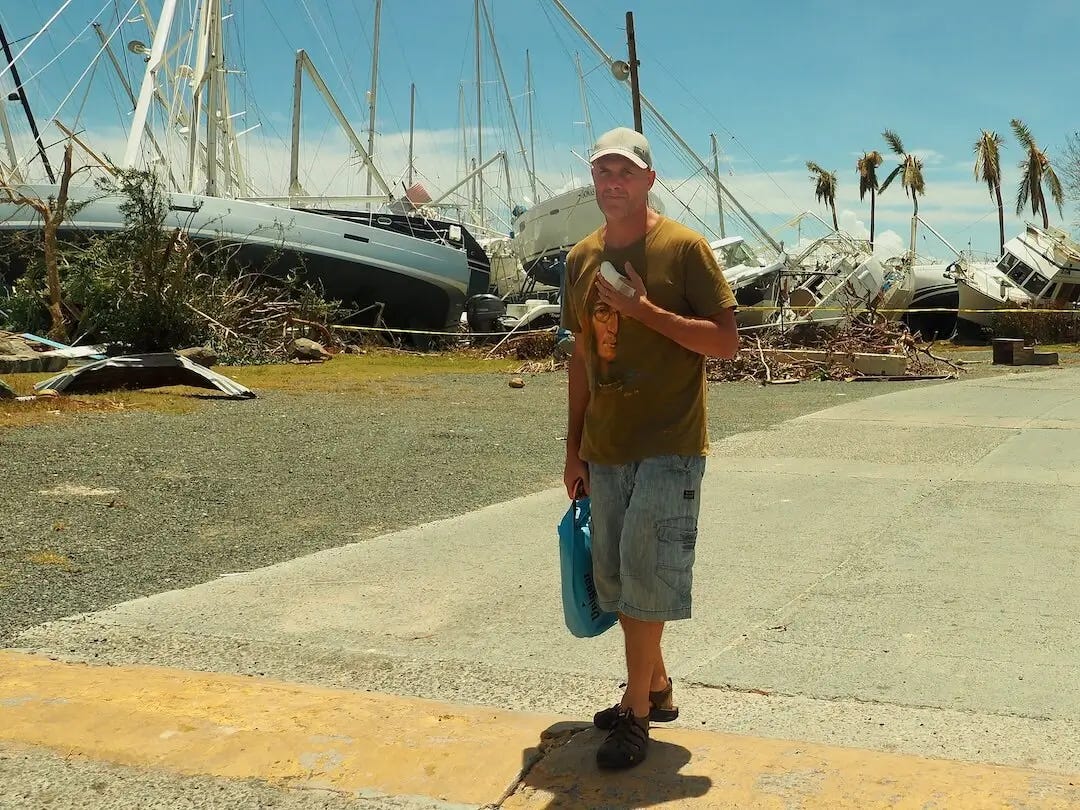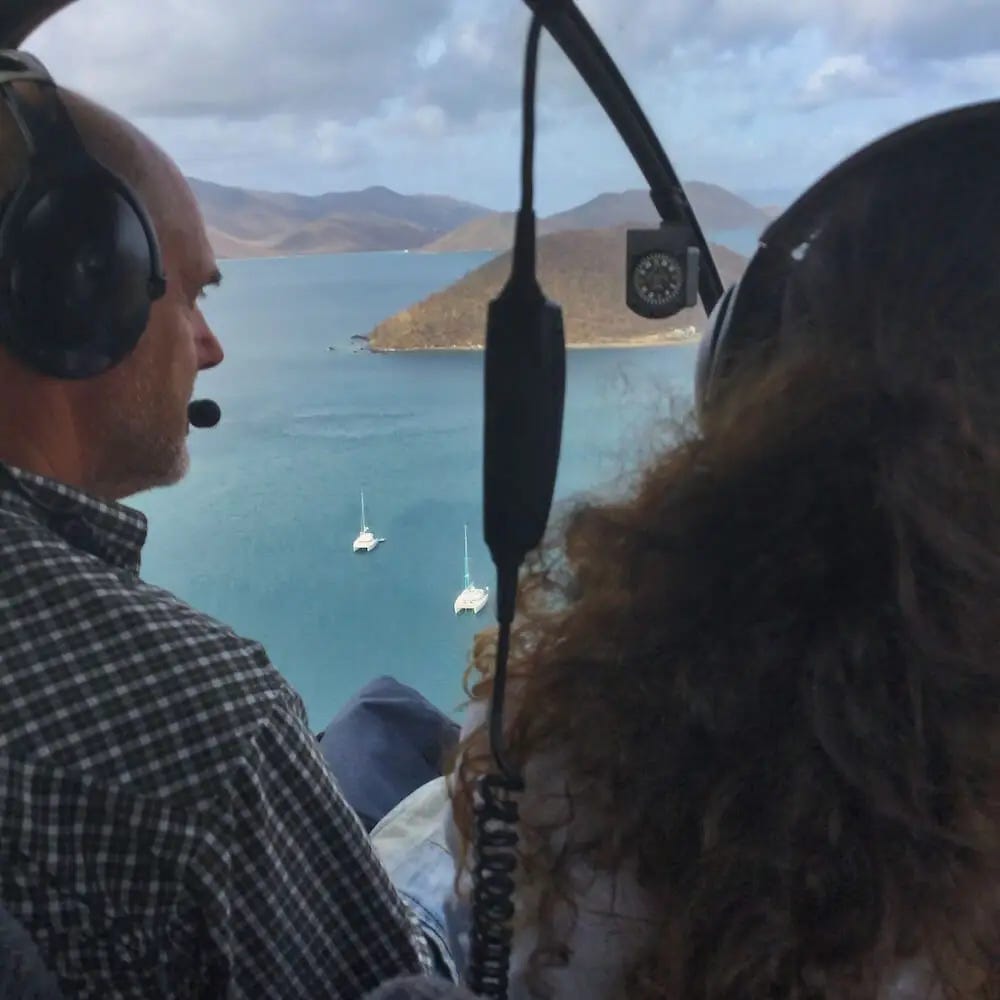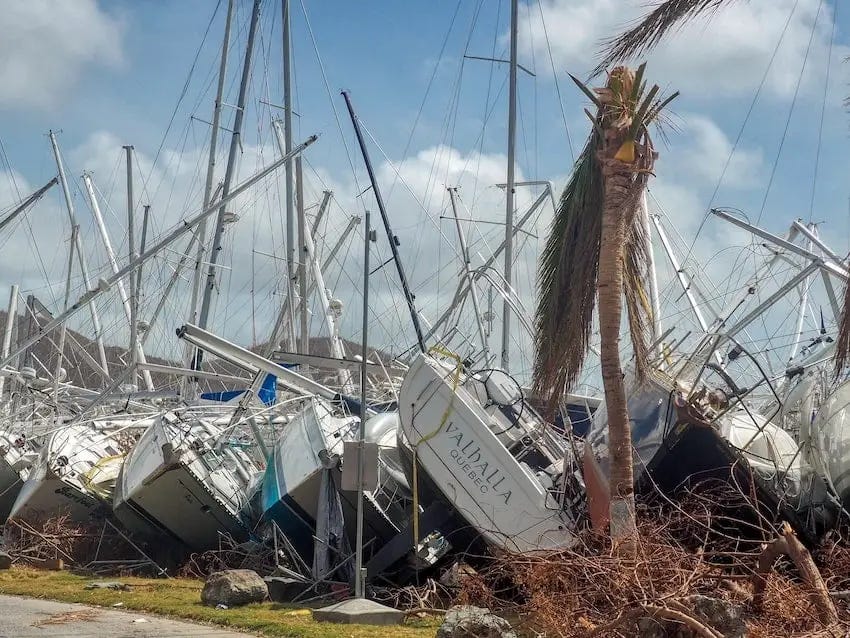How We Survived Devastating Hurricane Irma
Our story of seven tumultuous days in 2017 when the largest Atlantic hurricane ever to make landfall battered the British Virgin Islands
‘Despite my attempts to hold them closed for a full 30 minutes, the two heavy wooden doors finally gave way to Hurricane Irma and burst open, only to slam shut again with my fingers trapped between them.
I dropped to the floor holding my left hand and pulled off the glove I’d only just put on to improve my grip. My index finger was a bloody mess, smashed and partially severed. I screamed through a combination of agonising pain and physical tiredness. Thankfully, Lauren had the presence of mind to find a first aid kit from a bedroom close by, while Nicky screamed at me to crawl across to an adjacent closet containing just a toilet, sink and about 20 square feet of living space.
Between them, Nicky and Lauren managed to slam the closet door shut behind them, while the two doors standing between us and the largest hurricane to ever make landfall in the Caribbean were ripped from their hinges.
It was then that I passed out.’
Introduction
In 2017 we were lucky enough to book a housesit on the island of Tortola, in the British Virgin Islands, for a six-month assignment between May and November. Looking after four cats and providing security for the house, we enjoyed a blissful summer in a gorgeous house with beautiful surroundings.
Of course, the summer months in this part of the Caribbean are also prone to Atlantic storms and hurricanes, which usually form in the eastern Atlantic before heading westward, increasing in intensity along the way.
In September 2017, our stay coincided with the largest Atlantic hurricane to ever make landfall as it smashed into Tortola and elsewhere, sewing widespread destruction in its wake.
This is our story of what happened on that fateful afternoon and the chaotic days that followed.
Part One: The Eye Of The Storm
Preparing for the worst
Of course, hurricanes don’t just suddenly appear without warning. We were well aware of Hurricane Irma’s growing threat days before it actually struck the British Virgin Islands (BVI), thanks to websites such as the National Hurricane Centre and Windy. BVI’s Department of Disaster Management provided us with updates, too. Together with advice on preparation and the government’s plans to combat the storm.
As house sitters on the main island of Tortola, we were also in regular contact with our hosts in the US. So, in the days leading up to 6 September 2017, we prepared for the worst by removing anything surrounding the house which might be picked up by the wind as a projectile – plant pots, gardening equipment, a pagoda, ornaments etc. Anything too heavy to move, we strapped to balustrades. We didn’t board up the windows as they were installed as hurricane-proof, reinforced with hurricane shutters protecting all of the entry points to the house and outbuildings.
Elsewhere on the island, we’d seen and heard plenty of hammering and drilling as locals did what they could to put up protective barriers on their properties. Meanwhile, boat owners had moved their yachts and motorboats from their original moorings to sheltered waters.
We knew that the island’s electricity power would be affected so we made sure we had a good supply of diesel to fuel our generator. We stocked up on food and bottled water. And we made sure we had emergency supplies to hand such as torches, a first aid kit, candles etc.
We felt we were prepared.
In fact, so prepared that we happily relaxed over a cocktail or two on the eve of Irma’s arrival.
All the projections said it would be a massive Category 5 hurricane, which means a minimum sustained wind speed of 157 mph. Only the projections for Irma were for sustained wind speeds of 185 mph, and gusts of up to 250 mph. So, as it approached, our only concern was whether Irma would pass north or south of the island, or whether it would pass directly over us.
Awaiting the inevitable
The early morning of the 6 September was a calm one on Tortola. The sky was typically blue, except for some scattered clouds. And there was just the merest hint of a breeze, which was standard for an island that’s caressed by the westerly trade winds for most of the year.
Normally, there would be just Nicky and I having breakfast overlooking the Sir Francis Drake Channel. But this morning we’d been joined by Lauren, an acquaintance of ours on the island, who we’d invited to stay for the duration of the forthcoming storm rather than try and ride it out on her own.
After breakfast, we completed the final checks around the house, clamped the hurricane shutters and locked ourselves inside, together with the four cats we were looking after. We’d decided that the best place to stay was the first-floor lounge, behind a set of hurricane shutters, where we would also have access to two potential safe spaces should the situation become dangerous.
So, for the next few hours, we sat comfortably on sofas, checking the news and social media channels for updates on Irma.
As the morning drifted on it became more and more apparent that the eye of the hurricane, containing the very worst of the storm, was going to pass directly over us. Nicky posted some video footage of the strengthening wind on Facebook and we began to get media enquiries from Sweden, Canada, the US and the UK for our on-the-ground perspective. Along with increasingly anxious Facebook messages from friends and family watching the hurricane approach us live on TV.
Looking out through the windows, it was clear that the wind speed was accelerating. A papaya tree had already been uprooted and crashed into the property’s swimming pool. A large mango tree had collapsed in the drive onto the roof of a car. The sea below us was surging in all directions. Trees in front of us were swaying back and forth, to the point where at times they were almost horizontal. And the air was matted with flying debris, mostly dislodged foliage from the surrounding jungle.
Although we’d felt relatively calm for most of the morning, there was now a palpable sense of increasing anxiety as the storm around us intensified.
Irma arrives
We decided it was time to move to a safer area as the eye was still 30 minutes away and the situation was only likely to worsen. Nicky was distracted for a moment by a message from NBC wanting to arrange an interview with us within the next few minutes.
But all our preparations and relative calmness were shattered when the double exit doors connecting the first-floor lounge to the external patio area blew open. Our place of sanctuary was now exposed to the full force of the storm. And from this moment, we switched to operating on gut instinct rather than following a plan.
My first reaction was to rush over to the doors and slam them shut. The wind was spiralling violently and seemed hell-bent on forcing the doors open again. My grip on the two doorknobs became increasingly tenuous as my hands moistened with sweat. In an attempt to strengthen it, Nicky and Lauren found some rope, tied it around one of the doorknobs and attached it to some metal railings at the top of the stairs. Nicky also found some gardening gloves for additional grip.
At least four times, the doors blew open again, almost dragging me outside and into the full force of the wind. Nicky and Lauren had identified the closet over the hallway as the safest place for us to retreat to. In fact, Nicky was begging me to let go of the doors. But my one thought was that they were the only things protecting us from the killer winds outside.
And then, as tiredness was setting in, another almighty gust blew the doors open once more before slamming shut again, catching the index finger of my left hand in the process. The decision had now been made for us as we retreated to the small closet.
Riding out the storm
Our priority was to secure the room and Nicky to dress my injury. So, while Lauren held the door, Nicky bandaged my finger tightly to stem the flow of blood. Lauren had also had the foresight to collect a couple of cushions from the sofa which were used to lay my head on as I passed out for a few minutes.
Nicky then joined Lauren holding the door closed as the worst of the hurricane raged through the lounge. We could hear windows smashing and furniture crashing around the room as 225 mph winds ripped through the house. The closet door banged continuously as they tried desperately to keep it shut. And the noise was petrifying.
Two additional problems soon became apparent. First, water started seeping in from under the door. And second, there was the smoke. Our only choice was to place the cushions against the door, which thankfully worked. We established afterwards that the smoke was probably caused by water getting into exposed sockets after their plugs had been ripped out.
It felt like the whole house was shaking. Almost as if we were in the midst of an earthquake rather than a storm. And we could feel our ears popping, which we presumed was due to the frequent changes in atmospheric pressure.
We’d expected a lull – a short period of calm while Irma’s eye passed over us. And we’d planned to use that time to collect food and painkillers from downstairs. Indeed, from the small window in the closet, we could see a pocket of blue sky as the eye approached. But the lull never came. The ferocious winds just carried on. What's more, we were riding the wall of the hurricane to the side of the eye. So not only were we in the midst of the biggest Atlantic hurricane ever, but we were also being subjected to an extended onslaught of the worst part of the storm.
For the next TEN HOURS, we sat tight in the tiny room, exhausted, frightened and hoping that the winds would finally abate. Nicky and Lauren took it, in turn, to hold the door closed, not taking any risks with the sudden gusts that continued to haunt us.
At around 10 pm, they took their first tentative steps back into the lounge to survey the damage and look for an opportunity to collect some provisions. Happy that the worst of the wind had subsided, they managed to gather enough for us to curb our hunger and regain our strength, together with some blankets to help us get some sleep. And enough cognac for me to drink as an anaesthetic against the pain.
We also looked for the four cats. Two had escaped through a door earlier, though we presumed they were hiding in their usual space under the house. The whereabouts of the other two were still a mystery. But without light, it was impossible to search for them until dawn.
Having decided that the closet would still be the safest place for us to rest, we stayed there until around 5 am before we again ventured out to look around the house. To our relief, the other two cats had taken refuge in our downstairs bedroom and were unharmed.
Dawn was starting to break as we wondered what sort of scene we’d be confronted with once we stepped outside. At that moment, a figure appeared at an opening where a window used to be.
“Welcome to the Caribbean!” beamed our neighbour, Barrie, who’d clearly not lost his sense of humour.
Hurricane Irma had passed and was on her way to wreak havoc elsewhere. For us, we were just glad to have survived. But, as we wandered outside into the daylight, it became ominously clear that our problems were far from over.
Part Two: Aftermath
Day One: Assessing the damage
A gentle breeze was all that remained of the Category 5 hurricane as it quietly whistled its way through the open spaces of the house. As such, it allowed us to look around and assess the damage.
Windows had smashed or been blown out of their frames. External doors had been ripped from their hinges. And heavy furniture had been tossed around like toys. The walls of each room were also covered with the smelly remains of vegetation.
The house itself was structurally fine, including the concrete roof – something we could be thankful for. Otherwise, we would have been exposed to the worst Irma could throw at us.
But outside was a different matter.
The elevated position of the house had once boasted panoramic views over the heavily forested hills of Tortola and across the Sir Francis Drake Channel to the US Virgin Islands. Views that had been dominated by the sparkling blue of the sea and the lush green of the hillsides.
Not anymore.
Where there had been thick forests there were now just bare, barkless tree trunks, their branches reduced to the occasional outstretched finger of wood as if gasping for breath. The dominant colours on display had changed from blue and green to blue and brown. It was an apocalyptic image that encapsulated the destructive force of Irma.
Before
After
During the morning, our neighbour, Barrie, whose house had been badly damaged, arrived to brief us on what he saw as our priorities. He’d lived with his wife, Arabella, on the island for 12 years. And, although he'd not experienced a hurricane of this magnitude, he had a good idea of what the government response would be and what some of the likely outcomes were. The picture he painted was an alarming one.
He said the government would probably take four or five days to get its act together and restore communications. Help was not likely to arrive before then, so we had to look out for ourselves. Law and order were likely to become an issue, with looting a real problem. And, as we were in quite an isolated setting, we were prime targets.
Power supplies would be down for weeks, so we needed to conserve as much diesel as we could to fuel the generator for the house. We would combine our food and water resources and run the fridges and freezers on limited generator power to keep everything from going off.
And, as we had no immediate way of getting off the hill, my partly-severed finger would need to be patched together with superglue to stop infection. If I needed an incentive to get to a hospital in record time, that was it! The dressing Nicky had applied to it during the height of Irma hadn’t been sterilised, nor had the wound been cleaned, so getting proper medical attention was becoming our number one priority.
The dressing may have been blood-soaked, but at least there was no more potential infection from the moist, humid air.
And the superglue was definitely staying in the drawer!
The hospital in Road Town was a good 30-minute drive away. But the steep, winding road down to the coast from our elevated plot was difficult to negotiate at the best of times. And now it was impassable as trees, cacti, telegraph poles and boulders blocked its path.
Barrie didn’t wait to get started with his chainsaw. Unable to assist, I helped Nicky and Lauren clear debris from the kitchen and our bedroom to provide some manageable living space.
After the previous tortuous, sleepless night, it was mentally and physically exhausting. Nevertheless, Barrie managed to cut through to the first of four bends in the road before he had to call it a day.
As sunset approached, Barrie and Arabella arrived together with the contents of their food cupboard. And a healthy appetite. We switched our generator on for a few hours, took it in turn to shower and then shared a meal of pasta and some chilli-con-carne I’d made a couple of days earlier.
We even managed the odd bottle of wine between us.
We figured we deserved it.
Day Two: Digging our way out
The next morning, Barrie was up early and ready to tackle the next road section with his chainsaw. Only this time, Nicky wasn't prepared to let another day go by without me receiving proper medical attention (even though we didn’t know if the island’s hospital would be open). So our road recovery team got its second member, while Lauren and I continued to clean up the kitchen.
Undoubtedly, one of the most exhilarating sights of this whole saga was Nicky returning to the house some hours later with her arms raised in a triumphant salute. The wide grin on her face confirmed what I'd hoped for – they’d made it far enough down the hill to make it passable for Barrie's truck.
Someone had told them that Peebles Hospital was open, too
Within half an hour, we were on our way. We reached the coast road and turned towards the capital, Road Town. The road was in a bad state with large cracks and holes, together with lots of debris that had slipped down from the surrounding hills.
We reached the residential area of Sea Cow’s Bay and were astonished by the amount of destruction to houses, power lines and vehicles. Roofs had gone, walls had collapsed and people were trying to begin the impossible task of cleaning up.
We were surprised by the amount of traffic, too. It seemed like there were whole families crammed into cars, some of whom appeared to be merely sightseeing and slowing down to take photographs, apparently oblivious to the frustrated drivers behind them.
And then, as Barrie had predicted, we saw the looters.
Cars were double-parked outside a supermarket, wrapped in a mangled steel bow. Men and women rushed in and out with packed shopping trolleys. Some didn’t even bother with that as they headed straight to the drinks aisle and emerged with boxes of cheap beer and spirits. Then a truck arrived with a gang of mask-wearing youths in the back. Needless to say, we didn’t hang around. It was the first time we’d felt a real sense of menace.
We continued through the rubble and the destruction until we reached the hospital. As expected, the scene was chaotic. There seemed to be hundreds of people milling around both inside and outside the building. Our first point of call was with the triage nurse to have the dressing replaced. It was the first time my finger had been exposed to fresh air since the time it had been smashed between those doors. And it hurt like crazy.
I needed to see a doctor but that didn't look likely. We were told by three nurses that, because more than 12 hours had now expired since the injury (in fact, it was 48 hours), they would not stitch it and the wound would have to heal by itself. Each time, the nurse unwrapped the dressing to look at the finger. And each time, my resistance to the excruciating pain took a nosedive.
Thanks to Nicky’s persistence, and her insistence on not taking “No” for an answer, we finally (after six hours) managed to see a doctor, who agreed to apply the stitches. It was one more extended period of pain to endure, but it had to be done. I’ll be eternally grateful to the wonderful Dr Stoutt, who was working voluntarily through the crisis to help people like me – many with much worse injuries. We also overheard other medical staff who’d been working non-stop at the hospital since before the hurricane and hadn’t even been home to see their families.
Unfortunately, there was a FOUR HOUR waiting list for prescriptive drugs and Barrie was anxious to get back before dark because of the challenge of driving up our hill. I’d have to rely instead on our small supply of paracetamol tablets and antibiotics.
Back at the house, we were met by Gareth, a neighbour further down the hill. He’d cycled up to us to check we were ok and tell us he’d spoken to our house owners back in the US who'd put the word out on social media that we were safe. He also told us about the wider devastation to BVI and the scale of the media coverage from all over the world.
But then came the bombshell. A major new threat in the form of Hurricane José – a Category 4 storm - was heading straight for us.
Day Three: Hurricane José approaches
The following morning began as another calm, clear day. But, feeling vulnerable to another storm, we needed to establish what threats Hurricane José would present us with.
Apart from what we’d heard from Gareth and an official at the hospital, we’d had no information about it, or when communications or power would be restored. There was no internet and no phone signal. Everything Barrie had told us about the government response appeared to be coming true.
Apart from the odd reconnaissance aeroplane, we’d seen no activity in the air or at sea. So, the sudden appearance of a group of small boats speeding across the Sir Francis Drake Channel was a welcome sight. We’ve no idea who they were or where they were going but, for us, it was a small step in the right direction.
Our moment of reflection was suddenly interrupted by the cackle of a voice coming from a megaphone. It was coming from a van passing on the coast road below us. But, already starved of information, we struggled to hear what the voice was saying over the rumbling of our generator.
I decided the only option was to race down the hill on foot and catch up with the van – which I did. The guy on the megaphone was warning about the approach of Hurricane José later that evening and urging residents to take shelter by the newly-imposed 6 pm curfew. I flagged down the van and asked the crew if José would be a direct hit, just like Irma. They said they didn’t know but confirmed it would be a Category 4 hurricane (sustained winds up to 157 mph) and that there would be a lot of rain.
I also spoke to some locals whose homes had been severely damaged. They were terrified that the storm might follow the same route as Irma and were boarding up their open windows and patching up their roofs as best they could. Just when everyone thought they could focus on restoring their homes and trying to re-establish some sense of a normal life, another potential disaster was already looming.
Returning home, I gave the bad news to Nicky, Barrie and Lauren. Our house was still wide open from the impact of Irma, so we’d have to board up as many windows and doors as possible. We decided the best place to sit out the storm would be in our bedroom. Although one of the windows had blown out during Irma and the floor had been temporarily flooded, it had still suffered less damage than other rooms in the house.
Again, Nicky had to help with all the heavy work by retrieving plywood and planks from a store below the house. Meanwhile, Barrie resized the wood, erected the barricades and reinstalled unbroken windows into their frames. And all this before he’d even started on his own home (which, because of the damage to his actual house, was temporarily another neighbour’s house just down the hill from us).
This time, learning from what we experienced during Irma, we were prepared for the worst.
As the darkness of the evening drew in we switched off the generator, retired to our bedroom and waited.
We had no idea when José would hit. All we could do was try and get some rest and be prepared to evacuate to the shower room (which we’d identified as the safest place) when needed. We couldn’t sleep because of the anxiety running through our veins. The eerie howling noise of the breeze outside played tricks on our minds, taunting us with imagined increases in velocity.
But José never materialised. As dawn again broke, we were both tired and mystified. Was the hurricane still on its way? Should we stay put or try to find out if we were still in danger?
Two voices shouting towards us from below gave us the answer. They belonged to two representatives from the firm Lauren worked for, who’d been looking for her to evacuate her from the island.
José had suddenly turned north before it had hit us and was no longer a threat, they said. And, to Lauren’s relief, she was to be airlifted off the island.
Our “hurricane family” was about to lose one of its members, but we were equally relieved for Lauren. With hindsight, our outcome from Irma may well have been completely different had she not been there with us. And I owe her a debt of gratitude for having the presence of mind to find the first aid kit to dress my injured hand.
But it was now four full days since Irma first hit and we hadn’t been in touch with any of our family and friends. We knew they’d be worried sick,
especially if the media were showing such scenes of destruction.
With my finger wound and the very real potential for septicemia setting in, we needed to find a way to get off the island soon. But without access to the internet or a phone signal, there was no way we could even attempt it. So we wandered down the hill to try and find someone to speak to who might give us more information.
Along the way, another of our neighbours mentioned that someone had access to a single wifi signal at Nanny Cay, a resort marina and boat yard 15 minutes away. The only problem was that access was strictly for residents, business owners and staff.
It was a long shot that we couldn’t afford to pass up. Barrie had been right all along. We couldn’t rely on anyone but ourselves to remove us from this situation. So we returned up the hill, updated Barrie on what we’d learned and picked up Nicky’s iPad, the solitary piece of communication equipment still working.
But, as we drove down the hill once more, we had no idea just how much the chain of events would turn back and forth over the next 48 hours.
Part Three: Sanctuary
Day Four: Contact with the outside world
The arrival of The Royal Marines was, to say the least, a welcome sight on the island. With each passing day, as food and water supplies became increasingly valuable commodities, the chances of an escalation in looting and a breakdown of law and order were heightened. And Nanny Cay, with its boatyard, retail businesses and plush condos, was a prime target. So, when we arrived, we were hopeful rather than expecting to enter the complex.
A barrier had been erected to prevent any unauthorised people just wandering in, and two marines were stationed to enforce it. Fortunately, Barrie knew one of the guys in charge and convinced him we needed to use the wifi coverage to arrange our evacuation.
We entered a world that was a symbol of the British Virgin Islands’ prosperity. Only, instead of immaculately maintained yachts and catamarans safely cradled in rows, there was now just a tangled mess of boats on their sides, blown over like a set of dominoes.
We witnessed a large catamaran that had crashed into a security office and turned over 180 degrees so that its two hulls were pointing toward the sky. And a communications tower had broken in two and smashed across the decks of the boats beside it.
Past the boatyard, we arrived at the condos and were directed to the one with the wifi coverage. And, sure enough, there were already half a dozen people sitting in the small yard out front with their phones, tablets and laptops. The wifi password had been pinned to the front door on a scrap of paper. A minute later, Nicky had connected via her iPad and logged on to Facebook Messenger. Her message to our family and friends contained just two words.
'We’re safe'.
It was an emotional moment. Four full days after Irma had hit, we’d finally been able to get word out. Within seconds Nicky’s sister, Kirsty, had replied followed by other family and friends. But with just a 20% charge left on her iPad and no charger (lost in the storm), we had to conserve as much battery power as possible.
So Kirsty became our go-to person for contact with the outside world. She’d registered us as missing persons with the British Foreign Office and added us to the BVI’s Evacuation List. She’d posted updates on her Facebook page and shared them on our own “AboveUsOnlySkies” Facebook page, too.
But her attention would now turn to looking for ways to get us off the island. We agreed we’d connect again the following morning after she’d had the chance to do her research back in the UK. For now, we had to conserve the remaining battery power on the iPad and return to the house before the 6 pm curfew came into effect.
Day Five: A desperate search
The following morning, we saw a guy trying to break into an empty house just down the hill from us. Not in the mood for anyone threatening the security on “our hill”, we rushed down to confront him. Nicky told him there were three vicious dogs tied to a gate further up the hill and that the owners wouldn’t hesitate to set them upon anyone they didn’t know. And with that, he picked up his empty holdall and trudged back down the hill while we kept our distance behind him.
Shortly afterwards, Barrie arrived in his truck. He’d tried to make it to Road Town to pick up some materials but had to double back because of the traffic. He felt that things were descending into chaos and that the best thing for us to do was to sit tight for a few days until more help arrived. The positivity that had kept us going over the past four days appeared to have drained out of him. To be fair, we could see he was both mentally and physically exhausted. Which was not surprising considering the hours of effort he’d put into getting us this far.
After the euphoria of yesterday, it felt like everything had fallen apart again. Having received a glimmer of hope that a route off the island was a real possibility, it now seemed as far away as ever.
I decided we had to take back control of the situation. Our hosts had left us their car to use, which I’d been driving during our stay on the island. Nicky didn't have the confidence to drive the incredibly steep and winding hill. But my injured hand meant if we were to get back to Nanny Cay, she didin't have a choice. And Barrie’s truck had been up and down the hill enough times to flatten any remaining vegetation partially blocking the way.
So Nicky jumped in the car and carefully manoeuvred her way over and through each obstacle in turn, careful not to let the wheels slide over the steep edges. I tried to help by walking ahead and moving loose bits of debris.
We arrived again at Nanny Cay, this time being refused admittance due to an ongoing emergency. They said it might be possible for us to return around 5 pm, but we knew that the 6 pm curfew would give us little time to organise anything with Kirsty.
Someone mentioned they’d heard about another wifi signal available at a cafe in Road Town. We decided to give it a try. After all, we had nothing to lose. But as the traffic was horrendous, we parked up on the outskirts of town and went the rest of the way on foot. An experience neither of us will forget in a hurry.
The last time we were in Road Town there was a Disney cruise ship moored in the picturesque harbour. Families were walking around town wearing Mickey Mouse ears and pastel-coloured boutique stalls were selling BVI tee-shirts. This time there were crumpled buildings, office blocks with their windows blown out and overturned cars everywhere.
Military helicopters whirred above while armoured vehicles, packed with newly arrived Royal Marines, sped past us. It was like strolling through the set of a disaster movie. Or a war movie, come to think of it. And amidst all this chaos was the bizarre scene of four guys who’d set up a table and chairs amongst the rubble of a previously well-heeled bar. Complete with a bottle of rum, mixers and four glasses.
Stoic resistance in the face of adversity.
But the presence of the military was such a positive one. We spoke with a few of them, asking for news, advising them of the security risk on our isolated hill and telling them how glad we were to see them. Despite the misgivings at home of the Government’s response, these men and women made us feel proud to be British.
The reason we were in Road Town, of course, was to try and find an internet signal. Needless to say, the cafe we were looking for didn’t have one. The Digicel office that supposedly had a phone signal outside didn’t possess one either. And the waiting list at the hospital to have my finger re-dressed was as long as ever.
We decided to cut our losses and head back.
Returning to Nanny Cay, Nicky once more used her powers of persuasion to obtain access to the site, and we again headed straight to the condo with wifi access. There were still no scheduled flights out of Tortola. Nicky’s sister, Kirsty, had found some flights back to the UK from Puerto Rico. We just had to find our own way there. But, as the ferries were still not running from the island, we found ourselves continually coming up against a brick wall.
Then an American girl, who’d overheard our conversation, asked us if we’d like two tickets on a private boat to St Thomas (US Virgin Islands) the next morning. It ultimately transpired that we didn’t have the right visa to make that happen. But she suggested I speak to a guy called Dylan, who used to work for Richard Branson on Necker Island, and who was trying to coordinate helicopter flights to Puerto Rico.
By this time, I was willing to give anything a go. She took me to Dylan’s condo where I discussed the possibilities with him. He couldn’t guarantee anything but said he was liaising with Richard Branson’s PA and the Governor’s Office in the BVI to evacuate people to Puerto Rico in a four-seater helicopter. There were two flights the next day, and due to a cancellation, there was a seat on each. To our amazement, there would be no cost attached. Without hesitation, we booked them both. I would get the first flight at 11:30, while Nicky would catch the later one at 13:30.
Before we left, Dylan warned us that the seats were still not guaranteed. He had yet to speak to the Governor to get permission for our evacuation but said we should still arrive ready to leave the following morning.
Ecstatic, we returned to tell Barrie and Arabella our news before heading to the house for an early night. Was this the moment our luck had finally changed? We didn’t dare to take anything for granted. But we did sleep soundly for probably the first time in what now seemed like a long while.
Day Six: Another setback
We had to pack lightly for such a small helicopter. But choosing what to take with us and what to leave behind was an easy decision compared with those we’d had to make over the past few days.
Barrie dropped us off at Nanny Cay – the final in a long list of brilliant gestures from someone who’d already lost so much to Irma. And now he was to look after the four cats under our charge during our housesit.
Within ten minutes we’d made it to Dylan’s condo, which sat opposite a makeshift helicopter landing space. He was still on his phone, coordinating and negotiating as usual. An ITN news crew interviewed us and asked if they could have a shot of us boarding the helicopter.
Everything seemed to be coming together. We were finally going home.
And then, just 30 minutes before my flight was ready to leave, Dylan took his phone from his ear and gave us the bombshell news. There were two emergency medical evacuations which had to take priority and Nicky’s seat was no longer available. It almost felt like it was bound to happen. Nicky broke down in tears.
But Dylan wasn’t finished. He’d managed to find us two seats on another helicopter flight the next morning at 8 am. The same conditions applied, though – he couldn’t guarantee them until he’d spoken to the Governor that evening. And rather than try and get back to the house, we could stay overnight at his condo.
By now our heads were spinning with the intensity of it all. And there was still the issue of my injured finger needing further medical attention. Our house sit hosts had arranged for a doctor to be on hand at our destination in Puerto Rico. But word about me had reached the military stationed at Nanny Cay. So, minutes later, I was sat in a hastily converted condo having my finger re-dressed by a military medic, surrounded by the Royal Marines of 40 Commando.
I couldn’t have been in safer hands.
And, our positivity was about to hit the roof as Dylan told us before we went to bed that our seats on the helicopter had now been confirmed.
Day Seven: Safe haven
Our anticipation was such that we got out of bed early and waited outside Dylan’s condo with our bags before anyone else was up. Eventually, we heard the helicopter before we saw its unmistakably yellow frame appear above the hillside. Within minutes we’d boarded, along with Bill, a British ex-pat in his 90s who’d lived on Tortola since 1968 and was being temporarily evacuated to Puerto Rico, ahead of a flight to Norway to stay with his son.
We lifted off and flew towards St Thomas, taking us back over “our hill” one final time. I asked our pilot, Maria, about who had organised and paid for our flight. She told me that Google CEO, Larry Page had deposited a large sum of money with Caribbean Buzz (who we were flying with) to evacuate people off Tortola. Like Branson, he owned an island in the BVI and was liaising with him to help people like us.
The flight to San Juan airport was a relatively quiet one. A time to reflect and take stock of what had happened over the previous days. There was no sense of excitement or optimism. Just a combined feeling of sadness and weariness.
We remained in Puerto Rico for a few days while we tried to get flights back to the UK, which had by now tripled in price. We eventually secured a flight back via the Dominican Republic and Germany, arriving at Birmingham airport where we were met by a beaming Kirsty.
Our first task was to visit the A&E department at the nearest hospital. As we sat in the waiting area, a young guy with a shoulder injury looked at my bandaged hand and asked me if I’d cut myself in a kitchen accident. I looked back at him, not knowing how to respond. And then, with what must have sounded like unnecessary sarcasm, I replied.
‘No, mate – I injured it in a hurricane’.
Deeper Dive: Five Years On From Hurricane Irma
Postscript
Of course, the ultimate and tragic irony of our story is that our “safe haven” of Puerto Rico was devastated by Hurricane Maria just five days after we’d left the island. And that, after Maria had wreaked further havoc on Tortola, too.
Three major hurricanes – Irma, Jose and Maria – in a matter of a couple of weeks. A sobering reminder of how the people of the Caribbean are exposed to such potential catastrophes every year.
We watched with horror the TV pictures of the devastation in the BVI, Puerto Rico and elsewhere. We felt the pain of the people we left behind. But we were two incredibly lucky people who could escape. Unlike many others, whose lives were invested in the homes and livelihoods that now lay in tatters.
Our journey to survive Irma and evacuate from the island included some good fortune and being in the right place at the right time. But we also have a lot of people to thank who helped us at key moments and without whom we simply wouldn’t have made it.
People such as Lauren who helped Nicky hold the closet door shut while Irma’s 200 mph winds raged outside. Like Barrie, without who we would never have got off our hill and into the hospital for my finger to be treated. And Dr Stoutt, who took control of a chaotic situation at the hospital and put in the stitches I desperately needed.
Like Kirsty who worked tirelessly in the UK on our behalf to raise awareness, update our family and friends and get us on a flight home. And Dylan (the Ed Sheeran lookalike) who negotiated our helicopter flight to Puerto Rico.
Like Richard Branson and/or Larry Page (probably both) for funding the helicopter flight (we’re still not entirely sure how that came about). And Chris and Eric, our housesit hosts, who arranged for our transportation and accommodation in Puerto Rico.
But we also have to thank each other. We undoubtedly saved each other’s lives. And we’ll certainly be more prepared if we find ourselves in the path of such a potential disaster again.
It’s also taught us about the spirit of human nature. When your life is in danger and you don’t have control of the outcome, you’re capable of doing things you never thought possible.
Our journey required, amongst other things, bravery, persistence, single-mindedness, quick decision-making, teamwork and a desire to make things happen for ourselves. Qualities that the people of the BVI and Puerto Rico are undoubtedly displaying as they try to recover their lives.



